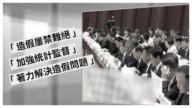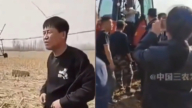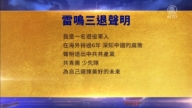【新唐人2014年05月09日訊】最近,中共和南海周邊國家的摩擦不斷升級,日前,菲律賓扣押中國漁船的同時,越南船只與中國船只發生衝突,導致人員受傷,到目前為止,衝突雙方都沒有退讓的跡象。評論指出,目前中國官民矛盾,利益集團之間的矛盾,以及中共與國際社會矛盾,不斷激化,互相感染。為了維護中共政權,中共只好把危機視線轉移到周邊國家。
5月7號,中國船只和越南海岸警衛隊船只發生了碰撞,中方向越南船只發射水炮,造成越南水手受傷。據美國《華爾街日報》報導,在這之前,越南曾經試圖阻止中國石油公司,在南中國海的爭議海域,部署一個大型鑽井平臺,兩國船只發生碰撞的地點,離這平臺大約有10英里。
越南指稱,中國鑽井平臺離越南海岸只有138英里,完全位於越南專屬經濟區範圍。越南外交部長範平明,在與中共國務委員楊潔篪通話時指責,中國船只在這個地區的採油作業是非法行為,違反了國際法,侵犯了越南的主權。
中共外交部發言人華春瑩,則指責越南妨礙中國的採油活動。 華春瑩說,越南的行為違反了國際法和國際關係的基本準則。她還說,楊潔篪在電話中,要求越南停止干擾中國企業的正常作業。
據中國國內媒體報導,中方已經向中、越爭議海域,增加80艘船只。
5月4號,中國廣東海警船向越南海警船發動撞擊,造成越南船只船尾右舷角落約1平方米面積的鋼板塌陷,船上部分設備遭到毀壞。5月7號,中國海警船再一次向越南船發動撞擊的同時,飛機也向越南海警俯衝。目前中國海警船全部撤下炮衣,準備隨時開火,局勢十分緊張。
時政評論員藍述:「越南實際上在執政理念上,跟中共還有一定相近之處的這麼一個國家,它現在跟它都要製造摩擦,只能說明中共已經走頭無路了,國內的矛盾已經是尖銳得不得了,黨內的各利益集團之間也沒有辦法達成協議,沒有辦法從國內的政策方面找到太多的出路,它不斷的把中國社會關注的焦點向中國周邊國家去引。」
同一天,菲律賓在南沙群島有爭議水域查扣了一艘中國漁船。船上有11名船員和大約500只海龜,其中部分海龜已經死亡。菲律賓表示,某些海龜物種受菲律賓法律保護,這艘漁船已被拖到巴拉望省,將面臨指控。
而在中國國內也不平靜,除了各地不斷爆發的維權群體事件外,最近三個省份的火車站也發生所謂恐怖事件。
美國紐約城市大學政治學教授夏明:「對中共來說,它現在形勢是非常恐慌的,因為它看到內政和外交的兩方面的困難,那麼再相互地交叉感染。在國內鎮壓的方式,影響了國際社會對中國的信心,他們的拋棄中國,就會加重中共國內的社會政治經濟危機。它想用一種強硬的方式控制住危機,但是我覺得這種強硬的方式,反而可能使事情變得更糟。」
藍述:「解決中國社會的矛盾,它需要一些替罪羊,在黨內的利益鬥爭中,輸了那就會去當替罪羊,輸和贏,最關鍵的一個問題就是誰掌握了軍隊,為了掌握軍隊,各個方面都在討好中共的軍隊裏面的鷹派,從黨內的各方面的矛盾尖銳到造成中共四分五裂垮臺,也不是沒有可能爆發與周邊國家的一些局部戰爭。」
《華爾街日報》評論說,中國在爭議海域部署大型鑽井平臺,引發兩國海軍對峙,成為這兩個鄰國近年來發生的最嚴重衝突。不過越南是一個強硬的對手,法國和美國都在這地區付出過巨大的代價。中國和越南雖然是社會主義陣營中的兄弟國家,不過越南政府不想讓外界覺得它在向中國低頭。而中國領導人很大程度上把政府公信力,押在了維護南中國海所謂「無可爭辯的主權」上。
美國「紐約城市大學」政治學教授夏明指出,在這場最新的對峙中,中國、越南、菲律賓雙方的民族主義情緒都在升溫,不排除有擦槍走火的可能。
採訪編輯/劉惠 後製/李智遠
Escalating South China Sea Confrontation: Is It Covering up China’s Domestic Crisis?
The Chinese Communist Party (CCP)
has escalated tension with neighboring
countries around the South China Sea.
The Philippines has detained Chinese fishing boats
Conflict between Vietnamese and
Chinese vessels has resulted injuries.
No party has shown signs of compromising.
Commentators point out that the CCP is faced
with intensified conflicts both at home and abroad.
To maintain it’s regime, the CCP has to shift public
attention from domestic crises to neighboring countries.
On May 7, Chinese vessels rammed into
and fired water cannons at Vietnamese
vessels, injuring the Vietnamese sailors.
According to the Wall Street Journal, Vietnam
had previously tried to prevent the deployment
of a Chinese oil rig in disputed waters.
The vessel collision took place about 10 miles from the rig.
Vietnam says the rig is 138 miles from its shore
and entirely within its exclusive economic zone.
Vietnamese Deputy Prime Minister and Foreign
Minister Pham Binh Minh called Chinese State
Councilor Yang Jiechi to criticize drilling operations.
Minh denounced the presence of China’s drilling rig as
illegal, and in serious violation of Vietnamese sovereignty.
Chinese Foreign Ministry spokeswoman
Hua Chunying accused Vietnam of
interfering in China’s oil production activities.
Hua Chunying said Vietnam violated international
laws, and basic norms of international relations.
Hua Chunying further commented that Yang Jiechi
requested Vietnam to stop interfering in Chinese
enterprises’ normal operations over the phone.
According to Chinese media, China has
sent 80 more vessels to the disputed waters
On May 4, a Guangdong maritime police boat
collided with the Vietnam Marine Police boat.
This resulted in damage of parts of the
Vietnamese boat and it’s equipment.
On May 7, as the Chinese maritime police
ship hit the Vietnam ship, a Chinese airplane
was also present to support the action.
Currently, the Chinese maritime police boats are ready
to fire with ready guns, and the situation is very tense.
Lan Shu, political commentator: “Vietnam
has very similar political rule as the CCP.
However, it still engages in such conflict with
China, meaning the CCP is in a desperate situation.
With sharp domestic conflicts, the CCP is
faced with internal conflicts within the party.
With lack of resolution, the CCP has to divert
Chinese peoples focus to neighboring countries.”
On the same day, The Philippines detained a
Chinese fishing boat in the disputed Spratly Islands.
This included it’s 11 crew members and a cargo of
approximately 500 sea turtles, some of which had died.
The Philippines said that some turtle
species are protected under their laws.
The vessel had been dragged to
Palawan Province to face charges.
Mainland China has also faced it’s own escalating conflicts.
There have been large scale human rights groups activities.
Three provinces have also witnessed public attacks
or bombs in railway stations during the past two months.
Professor Xia Ming, Political Science,
New York City University: “The CCP felt panic
due to difficult conditions domestically and with
foreign affairs, as well as their mutual impact.
The regimes oppressive nature domestically has
reduced the trust from the international community.
Ultimately, they abandon China, and subsequently there
are increased domestic economic and political crises.
The tough measures that the CCP has
employed, I believe, is making it worse.”
Lan Shu: “They need the scapegoat to
try to resolve conflict in Chinese society.
Whoever loses in the internal
fighting will become the scapegoat.
The most critical question is who
grasps control of the military.
The sharp conflicts within the CCP are
causing it to fall apart, and also possibly
result in war with neighboring countries.”
The Wall Street Journal added
further comment to recent events.
A naval confrontation between China and Vietnam, over
China’s attempts to anchor a giant oil rig in disputed
waters, is by far the most serious episode in recent
years between the two historically entwined neighbors.
Yet, Vietnam is a tough adversary, as French and later
U.S. forces in Indo-China found out to their immense cost.
China and Vietnam are now brothers
in a dwindling socialist fraternity of nations.
The Vietnamese government cannot
be seen to be bowing to China.
And modern Chinese leaders have staked much
of their credibility in upholding their “indisputable
sovereignty" over the South China Sea.
Professor Xia Ming indicates that it
is possible to misfire in this situation.
Nationalist sentiment is escalating in
China, Vietnam and The Philippines.
Interview & Edit/Liuhui Post-Production/Lizhiyuan




























